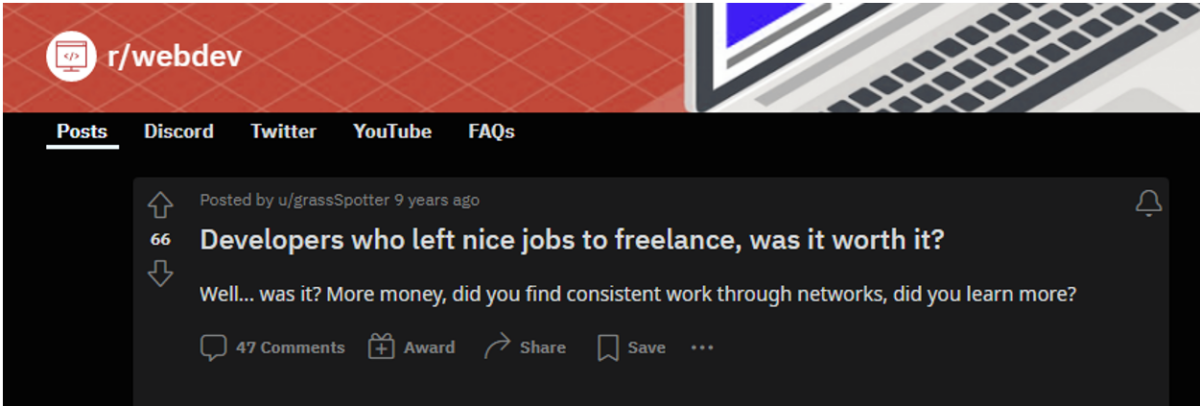As is the case with any freelance career, working as a freelance software developer offers flexibility autonomy, and the ability to choose the projects that you work on.
Though freelancing can be an incredible way to earn a living as a software developer, but it’s not without challenges. From registering your business to building a portfolio, there are many hurdles you’ll need to overcome. Where do you find clients? How do you set your rates? How do you market yourself effectively?
In this article, we’ll answer all of these questions and more. By the end, you’ll have a roadmap to becoming a successful freelance software developer. So, let’s dive in!
What Does a Freelance Software Developer Do?
A freelance software developer works independently to create custom software solutions for clients. They use their programming skills to design and build websites, mobile apps, and other software applications. Freelance developers are in charge of their schedules, and they must work hard to find clients and deliver high-quality work on time and within budget.
Becoming a Freelance Software Developer: Pros and Cons
Freelance software development is a lucrative career path that allows you to work on your terms and take on projects that you’re passionate about. However, it’s important to consider the potential downsides before diving in. Let’s explore the pros and cons of becoming a freelance software developer.
Pros
Here are some advantages of becoming a software developer:
- Flexibility. Freelance software developers can work from anywhere and anytime, so long as they meet their project deadlines.
- Autonomy. Freelancers can choose the projects they work on, which allows for greater autonomy.
- Higher pay. Compared to salaried employees, freelance software developers can earn higher hourly rates.
- Diverse work. Freelance software developers have the opportunity to work on a wide variety of projects, which can keep the work from becoming tedious or boring.
- Increased learning. Working on different projects allows freelancers to learn new skills and technologies constantly.
- Reduced overheads. Freelance software developers do not have to worry about overheads such as office rent, utilities, and other costs associated with running a business.
Cons
Some drawbacks of becoming a freelance software developer include:
- Unstable income. Freelance work can be unpredictable, with some months being more lucrative than others. This can make it challenging to budget and plan for the future.
- No benefits. Freelance software developers typically do not receive benefits such as health insurance, paid time off, or retirement plans.
- Client acquisition. Freelancers are responsible for finding their clients, which can be challenging and time-consuming.
- Limited social interaction. Freelance work can be isolating, with limited opportunities for social interaction or collaboration with colleagues.
- Inconsistent workload. Freelance software developers may experience periods of heavy workload followed by periods of little to no work.
How To Become a Freelance Software Developer in 7 Steps
Becoming a successful freelance software developer requires hard work, dedication, and strategy. In this section, we’ll outline seven actionable steps you can take to build your skills, develop your brand, and start attracting and retaining your previous clients.
-
Make a Concrete Plan
-
Identify Your Offerings and Prices
-
Develop Your Online Presence
-
Set Up Your Freelance Business
-
Identify Your Lead Generation Sources and Land Your First Client
-
Join the Freelance Development Community
-
Expand Your Business
Make a Concrete Plan
Without a clear plan, it can be challenging to build a thriving freelance software development career. Here’s what you need to do:
Invest Time in Research
Before you start marketing your services, it’s essential to understand the market you’re working in. This includes researching competitors, identifying market gaps, and understanding potential clients’ needs.
Knowing your potential clients is key to a successful career as a freelance software developer. Look at the types of companies that need your services, understand their pain points, and find out what they’re willing to pay for.
Create a Roadmap for Your Freelancing Journey
A roadmap helps you stay focused, motivated, and on track toward your goals. To create an effective roadmap, it’s important to remember the following key steps:
- Define your goals. What do you want to achieve as a freelance software developer? Do you want to specialize in a particular area, work with certain types of clients, or earn a certain amount of income?
- Break down your goals into smaller milestones. Once you’ve defined your goals, break them down into smaller, achievable milestones. For example, if your goal is to earn a certain amount of income, break that down into smaller monthly or quarterly income targets.
- Review and adjust your roadmap regularly. As you progress in your freelancing journey, you may encounter new opportunities or challenges that require you to adjust your plan.
Have an Emergency Fund
Especially when you’re just starting out as a freelancer, it’s helpful to have an emergency fund. Consider how much money you need to cover your monthly basic living expenses, including rent or mortgage payments, food, utilities, transportation, and any other regular expenses you have.
Once you know your monthly expenses, it’s time to determine how much you need to save to cover your living expenses for a certain period. Many financial experts recommend saving enough to cover three to six months of living expenses, but this can vary depending on your situation.
Identify Your Offerings and Prices
To get started, it’s important to first identify your skills and expertise. This may include programming languages, frameworks, tools you’re proficient in, and any specialized knowledge in a particular area.
Next, you should determine your target market. Who do you want to work with? Are you targeting small businesses, startups, or large corporations? This research also includes observing what other freelance software developers charge for their services.
Once you’ve defined your offerings, it’s time to set your price range. Consider your competition, target market, skills, and expertise when setting your prices. You want to ensure you’re competitive while charging what you’re worth.
Develop Your Online Presence
With the rise of remote work and the gig economy, a strong online presence is more critical than ever. It can help you stand out in a crowded market and give you the edge you need to secure high-quality clients and projects.
Here are a few ways to develop your online presence:
Create a Well-Optimized LinkedIn Profile
LinkedIn is a valuable platform for securing freelance work, as it allows you to connect with potential clients and showcase your work through your profile and portfolio. Creating a well-optimized LinkedIn profile means including relevant keywords in your description, adding a professional headshot, writing a comprehensive summary of your skills and experience, and focusing on getting endorsements from past clients and colleagues.
Develop a Strong Portfolio
Your portfolio should include various projects and certifications highlighting your technical abilities and demonstrating your problem-solving skills. Include descriptions of your projects, the technologies you used, and your personal contributions. You should also add links to any live projects, screenshots, and code snippets.
The portfolio can be hosted on a personal website, GitHub pages, or a website builder like Squarespace or WordPress. Moreover, you can leverage online platforms like Behance and Dribbble to showcase your design work and open-source platforms like GitLab to display your coding projects.
Build a GitHub Profile
A strong GitHub profile should include a range of well-documented projects demonstrating your technical expertise and coding style. Keeping your profile updated is essential, including actively participating and working on open-source projects.
Set Up Your Freelance Business
Starting a software development business can be a fulfilling and rewarding freelance career choice. However, it requires careful planning and organization to ensure success.
Register Your Business Appropriately
It is crucial to research the laws and regulations in your area to ensure that you register your business appropriately and avoid any legal issues down the line.
This includes choosing the legal structure of your business, registering for taxes, and obtaining necessary licenses and permits. Choosing the right legal structure, such as LLC or sole proprietorship, can protect your assets from business liabilities.
Build Your Tech Stack for Invoicing, Client Management, and Communications
Make sure you work with tools and software for invoicing, client management, communication, and project management.
A reliable invoicing tool will help you track your income, generate invoices, and manage payments. On the other hand, client management tools can help you keep track of your client’s contact information, project requirements, and project timelines.
Freelancers often use project management tools such as Trello or Asana. These help manage tasks, deadlines, and collaborations efficiently.
Other Tips
Besides registering your business and establishing your tech stack, make sure to do the following:
- Establish a workflow for onboarding clients, managing projects, and invoicing. This will help you maintain consistency and efficiency in your business operations.
- Network with others, attend industry events and connect with other freelancers to expand your network and gain referrals.
- Pick a narrow niche depending on your expertise, and focus on providing services only in that particular niche.
Identify Your Lead Generation Sources and Land Your First Client
Start by creating a list of potential clients and contacting them through email or LinkedIn. You can also leverage online platforms such as Upwork, Freelancer, or Fiverr to find clients looking for suitable candidates.
Once you start getting inquiries, respond promptly and professionally, providing clear information about your services, rates, and availability.
Join the Freelance Development Community
Community involvement can provide opportunities to network, learn new skills, and find potential clients. Let’s explore different ways to get involved in the freelance software development community and how it can benefit your career.
Build Your Network
To start building your network, consider attending local meetups, conferences, and events related to software development. You can also join online developer communities like LinkedIn groups or forums to connect with other professionals. Another way to build your network is by reaching out to former colleagues, clients, or classmates, or finding a good mentor.
Attend Meet-Ups
Meet-ups allow connecting with other software developers and learning new skills. If you’re interested in attending local meetups, consider searching on Meetup.com or Eventbrite. Look for events that are relevant to your interests and skill set. For example, if you specialize in web development, look for meetups focusing on web technologies like JavaScript or React.
Join Online Communities
Joining online communities is a great way to expand your network, learn new skills, and find potential clients or collaborators.
Reddit, GitHub, and LinkedIn groups are excellent examples of communities for freelance software developers. Make sure to genuinely participate in discussions and read the community guidelines before engaging.
Follow Experts on Social Media
When choosing who to follow, look for experts who are active on social media and share valuable content. You can also look for experts who specialize in areas that you are interested in or want to learn more about.
However, it’s important to remember that social media can be overwhelming and distracting. Be selective about who you follow and how much time you spend on social media. Focus on quality over quantity, and ensure the content you consume is relevant and valuable to you.
Never Stop Learning
Technology constantly evolves, and staying up-to-date on industry trends and new technologies can help you stay competitive and relevant in the field. From attending conferences to taking software development courses, there are many ways to continue learning and expanding your skillset.
Make sure to also develop soft skills like communication, time management, and problem-solving. These skills can help you work more effectively with clients and collaborate with other professionals in the industry.
Expand Your Business
One way to expand your business is by offering additional services like project management or consulting. This can help you provide more value to clients and establish yourself as a trusted advisor. Another way to expand your business is by partnering with other professionals in the industry. By collaborating with designers, marketers, or other freelance software developers, you can offer a broader range of services and take on more complex projects.
Becoming a Freelance Software Developer: Real-Life Examples To Learn From
Looking for inspiration on your journey as a freelance software developer? Here are two real-life examples and insights from fellow developers.
Kenny Gunderman
Kenny Gunderman is an experienced developer who documented his journey of freelancing on Upwork for 30 days on his YouTube channel. In the video, he shares his journey from his first job on Upwork to his final contract and everything in between. He also reveals how much he made from the 30 days and shares his thoughts on the platform.
Gunderman’s experience is an excellent example for aspiring freelance software developers looking to explore platforms like Upwork. One key takeaway from his experience is that while making decent money on Upwork is possible, it takes dedication and hard work.
r/webdev

This Reddit thread poses the question of whether it’s worth it to leave a full-time developer job and go freelance. The thread features a wide range of perspectives, with some people sharing their positive experiences as freelance software developers and others cautioning against the challenges of working independently.
By reading through the thread, you can gain valuable insights into the pros and cons of freelancing. You can also learn about the experiences of others who have made the switch and decide whether it’s the right decision for you.
Get To Know Other Software Engineering Students
Elena Nurullina
Junior Web Developer at G/O Media
Jason McGinty
Full-stack Systems Engineer at Technicity
Alyssa Menes
Software Engineer at Progyny
Resources To Find Opportunities as a Freelance Software Developer
Looking for opportunities as a freelance software developer can be challenging. Here’s where to look:
Freelance Platforms
Some popular freelance platforms for software development include Upwork, Freelancer, and Toptal. These platforms allow businesses to post job listings and browse profiles of freelance software developers. Professional developers can also create a profile, showcase their skills and experience, and apply for job opportunities.
One benefit of using freelance platforms for software development is that they provide security and protection for both businesses and freelance software developers. The platforms often handle payment processing and provide dispute resolution services.
However, freelance platforms also come with some drawbacks. They usually charge fees for using their services, and there is a lot of competition among freelance software developers. Consider the platform’s terms and conditions before signing up.
Job Boards
Some popular job boards for software development include Indeed, Angelist, and SimplyHired. These job boards allow businesses to post job listings and filter through resumes and applications from freelance software developers.
One benefit of using job boards for software development is that they often provide a wider range of job opportunities than freelance platforms. They also tend to attract more established businesses and higher-paying job opportunities.
Online and Slack Communities
Online and Slack communities allow for more informal and supportive interaction between their members and can also be a great way of sourcing freelance gigs.
However, being respectful and professional when participating in Slack communities is important. Don’t spam channels or promote your services excessively. Instead, focus on building relationships and sharing knowledge.
Network
Building a network might seem time-consuming, but it’s a very effective way of bonding with others. Be strategic and focused when attending events or participating in online meet-ups.
Freelance Software Developer FAQs
We’ve got answers to your most frequently asked questions:
Is It Hard To Become a Freelance Software Developer?
Freelance software development isn’t for the faint of heart. You’ll need to put in plenty of effort, commitment, and self-control to succeed. It can be tricky to balance client work, manage your time effectively, and stay on top of everything, but you can make it work with the development skills and the right attitude.
Are Freelance Software Developers in Demand?
Yes, freelance software developers are in high demand in today’s job market. With the rise of remote work and the increasing need for digital solutions, many companies are turning to freelance developers to help meet their software needs.
What Skills Do I Need To Be a Freelance Software Developer?
To be a successful freelance software developer, you must have a strong foundation in programming languages, communicate effectively with clients, and have strong problem-solving and time-management skills. You should also be comfortable working independently and have a solid online portfolio of past projects to showcase your skills to potential clients.
Which Programming Languages Are Best for Freelance Software Developers?
The programming languages best for freelance software developers depend on the specific needs of the prospective client and the project at hand. However, some of the most in-demand languages for freelance developers include JavaScript, Python, Java, Ruby, and PHP.
Can You Make 10K a Month as a Freelance Software Developer?
While making 10K a month as a freelance software developer is possible, it typically requires a lot of experience, a strong portfolio, and a steady stream of high-paying clients. It may take time to build up to this income level, but it is achievable with hard work and dedication.
Since you’re here…
Interested in a career in software engineering? Join our mentor-led Software Engineering Bootcamp or our foundational Software Engineering Course if you’re just starting out. We help people make the switch every day (just peep our reviews). You can do it, too!







